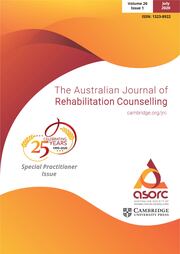Article contents
Experiences of positive career change among female breast cancer survivors: An Interpretative Phenomenological Analysis
Published online by Cambridge University Press: 27 October 2020
Abstract
This article reports on women’s experiences of career change following a breast cancer diagnosis and explores whether their illness represents the driving force to pursue previously unfulfilled career ambitions. The participants were four women who had been diagnosed with breast cancer and had changed career direction after their treatment. Data were conducted through in-depth interviews and were analyzed using Interpretative Phenomenological Analysis (IPA). Four themes prominent throughout each women’s narrative were identified: (i) a pre-diagnosis, unhappiness at work, (ii) a sense of stepping off the treadmill, (iii) a sharp focus upon their “self,” and subsequently (iv) a flourishing “work-life.” Further research is needed to investigate how common these findings are among women with breast cancer.
- Type
- Articles
- Information
- The Australian Journal of Rehabilitation Counselling , Volume 26 , Issue 2 , December 2020 , pp. 120 - 135
- Copyright
- © The Author(s) 2020. Published by Cambridge University Press and The Australian Journal of Rehabilitation Counselling
References
- 1
- Cited by



